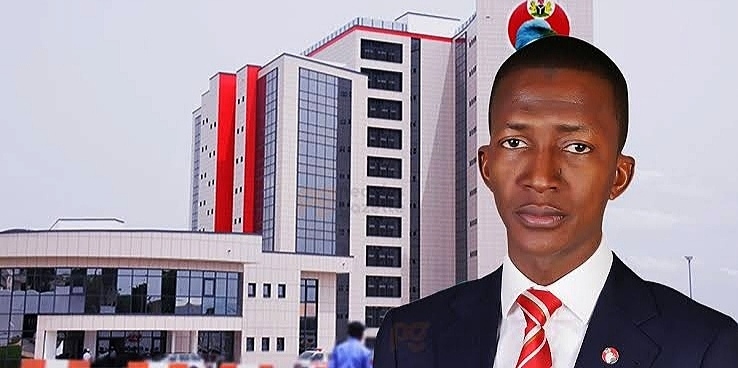By John Ikani
A High Court of the Federal Capital Territory sitting at Maitama has vacated the contempt proceeding that led to the conviction and committal of the Chairman of the Economic and Financial Crimes Commission, EFCC, Mr. Abdulrasheed Bawa, in prison.
Justice Chizoba Oji set aside the proceedings on Thursday after hearing an application brought by Bawa.
Justice Oji had on Tuesday, ordered the Inspector-General of Police to arrest and remand Bawa at the Kuje custodial centre for contempt of an order of court made on November 21, 2018 directing the EFCC to return to a former Director of Operations at the Nigerian Air Force, Air Vice Marshal Rufus Adeniyi Ojuawo, his Range Rover and N40m seized by the commission.
However, the application was brought pursuant to Section 6(6) (a) and Section 36(1) of the constitution of the Federal Republic of Nigeria 1999 (as amended), Section 91 of the Sheriffs and Civil Process Act, Cap S6 Laws of the Federal Republic of Nigeria 2004 and other relevant enactments explaining the EFCC chairman’s role in the case.
The court found that the EFCC chairman was not in contempt of court as he had complied with the order that Ojuawo’s Range Rover be released and by several internal memoranda, he had initiated the commission’s internal mechanism to ensure the payment of N40m.
“I hereby set aside the entire contempt proceedings in Suit No. FCT/HC/CR/184/2016 between the Federal Republic of Nigeria v AVM Rufus Adeniyi Ojuawo,” justice Oji ruled.
“That I further set aside the conviction of the applicant, the Executive Chairman, Economic and Financial Crimes Commission, for contempt unconditionally.”
Backstory
In 2016, The EFCC arraigned Air Vice Marshal (AVM) Rufus Adeniyi Ojuawo, a one-time Director of Operations at the Nigerian Air Force (NAF) on a two-count charge bordering on corruption.
The EFCC accused him of illicitly receiving N40 million gratification and a Range Rover Sport (Supercharged) one Hima Aboubakar of Societe D’Equipement Internationaux Nigeria Limited.
During investigations, the EFCC seized his properties alleged to have been corruptly received.
However, the court discharged and acquitted Mr Ojuawo of the charges proffered against him by EFCC.
On November 21, 2018, the court held that the prosecution failed to prove its case. Consequently, the judge discharged and acquitted Mr Ojuawo of the charges and ordered EFCC to return his seized properties.
The judge held that EFCC failed to prove that Ojuawo either corruptly accepted the gifts from anyone or accepted the gift in the course of discharging his official duty.
After four years of not receiving his property as ordered by the court, Mr Ojuawo approached the court again seeking an order compelling EFCC to release them to him.
The court consequently convicted the EFCC boss for failing to obey the order of the court made in 2018.



































